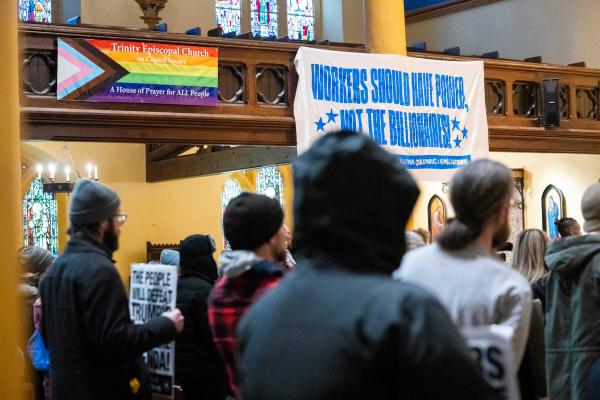This week, Justice Ruth Bader Ginsburg, who died Sept. 18, becomes the first woman to lie in state at the U.S. Capitol — after a life breaking so many barriers for women. Thinking about her life over the past week, I’ve realized how many of the things I take for granted began with her work. As a woman, I can have a credit card in my name, open a bank account, and buy a house through a mortgage without a husband's signature. I can also inherit land, and I am protected from being fired if I become pregnant, none of which was possible for every woman in the United States before the 1970s. While Ginsburg was not personally involved in every single new right that women gained after 1970, almost all of them can point to the 1971 Supreme Court case Reed v. Reed, for which she wrote the brief. The step-by-step progress ever since can be a guide as we press ever further.
For the first time ever, the Supreme Court agreed that the 14th Amendment made discrimination on the basis of sex unconstitutional. The victory overturned centuries of precedent — prior to this case, the Supreme Court had rejected any challenges to laws that discriminated against women. Only 10 years before, in Hoyt v. Florida, the Court had ruled a Florida law that blocked women from doing jury duty because they were "the center of the home and family life" did not violate the Equal Protection Clause. Both decisions were unanimous, meaning that Ginsburg changed the minds of at least the three Supreme Court justices who were on the bench for both cases. In a 1988 speech she said, “To turn in a new direction, the court first had to gain an understanding that legislation apparently designed to benefit or protect women could have the opposite effect.”
In her time at the ACLU, Ginsburg argued six cases before the Supreme Court, winning five of those. Her victories built the groundwork for women’s equality in the United States: In the course of five years, laws that legally defined men as providers and women as homemakers changed. A new world was possible without the legal walls that had confined men and women in specific, sex-based social and economic roles. It’s hard for me to even imagine what my life would look like without that work.
'The Law of the Creator'
In a more personal way, I think one of the biggest impacts of Ginsburg’s life is that her arguments didn’t just change legal frameworks, they also helped change cultural frameworks. In my life, I’ve moved through multiple cultural frameworks where there were remnants of the idea that men were the strong providers and protectors of women, and women were the dependents and nurturing centers of home and family life. The saddest part for me is that some those frameworks resided in my faith communities. The Bible was used to support the idea that men and women were locked into God-ordained, sex-based roles. Those “roles” made me feel I could not, or should not, make use of some of the opportunities I had.
I think that is one of the reasons I feel so infuriated when I read about the 1873 case where the Supreme Court allowed Illinois to ban Myra Bradwell from becoming a lawyer because women were too fragile to be lawyers, writing that, “The paramount destiny and mission of woman are to fulfil the noble and benign offices of wife and mother. This is the law of the Creator."
Ginsburg did not only help strip the laws of those defined roles for the sexes, but she helped free me from them too. Her life and work affirmed in me the desire to pursue my life and career goals, even if that meant I would have to fight the cultural expectations of what women could and could not do. Even more important, her life and work affirmed my calling — which, for me, stems from my Christian faith — to pursue justice for all. I work to remove the barriers that prevent groups of people from fully achieving their purposes and dreams in life. I also work to end cultural and legal frameworks that are based on the idea that some people are inferior to others and less capable of doing certain things. In those ways, I feel a kinship with Ginsburg and an aspiration to match her accomplishments.
We must carry on Justice Ginsburg's legacy and continue to work for a world where all people are given equal respect and opportunity. The justice movement doesn’t ever reside with a single person. Nor should it. Each of us is flawed, with places we need to grow in our understanding of different forms of oppression. Ginsburg herself drew upon the Doctrine of Discovery to justify a ruling that denied Indigenous sovereignty in City of Sherrill v. Oneida Nation. She was critical and dismissive of Colin Kaepernick's kneeling during the national anthem to protest police brutality against Black lives.
Ginsburg later apologized for her comments about Kaepernick, but these events highlight the need for all of us to continually learn about how we contribute to our neighbor’s oppression and at the same time how our liberation is tied to that of our neighbor’s. This is why we must work together to achieve freedom from oppression for all. It is only by coming together in our collective power, holding each other accountable, and growing together that the movement for justice has continued over generations and will continue even now.
The work ahead
COVID-19 has shown us that we are more interconnected and interdependent on one another’s health and well-being — and that when each of us flourishes, we all flourish. It has also brought into focus how much work we still have left to do. Those who have been hit the hardest by this pandemic have been people of color, and especially women of color. Women often hold jobs in the industries and fields most affected by the pandemic, like the service industry, education and child care, and hospitality. Jobs like these rarely have flexible hours or health benefits and are often underpaid. This makes it even harder for women who suddenly find themselves designated essential workers, exposed to illness and with limited access to personal protective equipment in order to make ends meet, or who end up unemployed as their job disappears, perhaps permanently.
These issues are only exacerbated at the intersection of race and gender. Black, Indigenous, and people of color have higher rates of death than their white counterparts. Black women and Latinas are more likely to lose their jobs to the economic pressures of the pandemic than white women. Illness may not discriminate, but our health care and our economy certainly do.
Even for women who haven’t lost their jobs, COVID-19 has shown how much further we must go in order to achieve true equality in the workforce.
This pandemic has shown the ways that cultural expectations and the lack of economic safeguards make it extremely difficult for women to find a healthy work-life balance. We have a 40+ hour workweek, but no universal child care. It’s a holdover from the time where society expected men to be the sole provider for the family, while women worked at homemaking, a necessary but often undervalued task. Today, those jobs – cooking, cleaning, child care, and household budgeting – are still seen as undeserving of pay, even though they are time-consuming and required for our society to function. The burden of these tasks still falls overwhelmingly onto women in the United States.
This spills over into the pay gap – employers often see women as deserving less pay than men. Today, white women earn 79 cents for every dollar that white men do. For Black and Latina women, it gets worse: They make 62 and 54 cents, respectively, for each dollar that white men do.
Our economic system has never been able to support a flourishing family life. We have no laws for paid family leave, meaning that parents often must choose between time with their child and their income. But this also harms the people who give birth more than it harms others. While the Family and Medical Leave Act guarantees maternity leave, it does not guarantee paid maternity leave. Often pregnant people are forced to use sick or vacation time, if they get paid time off at all. All of these things contribute to creating a system that makes it nearly impossible to have a healthy work-life balance, especially for women.
As we look at the upcoming unprecedented election, there is an opportunity to further our collective work to achieve equality for all women. Other than working for equal pay for women and for economic systems that promote equality, there are other concrete goals that we can work toward.
Ruth Bader Ginsburg notably said, “Women belong in all places where decisions are being made.” We believe this is true in church leadership, from clergy positions to church councils, from denominational leadership to organizational and nonprofit leadership. To achieve that vision, we must continue to work to close the gender gap in church leadership through storytelling, scriptural analysis, and sharing resources with our communities.
For Ginsburg, that quote especially held true on court benches and in the halls of Congress. One of the major legal pathways she promoted was the Equal Rights Amendment. Ginsburg was a strong proponent of this constitutional amendment because it would provide a constitutional grounding for laws and judicial rulings to resolve many of the legal and economic inequalities women still face today.
In Congress, we must also continue to advocate for trauma-informed, women-empowering legislation, especially legislation that centers women who are survivors of sexual and domestic violence.
In both the church and society at large, we need to advocate for policies and laws that prevent sexual and domestic violence and that promote healthy responses that support women who are experiencing violence or are survivors of violence. We need to fund those support systems and work to remove the barriers that women face in accessing them, including racism, economic inequality, and a lack of immigration status.
Ginsburg was a woman well acquainted with adversity. Even though we are filled with grief and are looking to the future where there is still much work left to do, we must embody Justice Ruth Bader Ginsburg’s spirit of overcoming adversity. We will win with dedication, hard work, and, in her words, “[fighting] for the things that you care about, but [doing] it in a way that will lead others to join you.”
Got something to say about what you're reading? We value your feedback!







